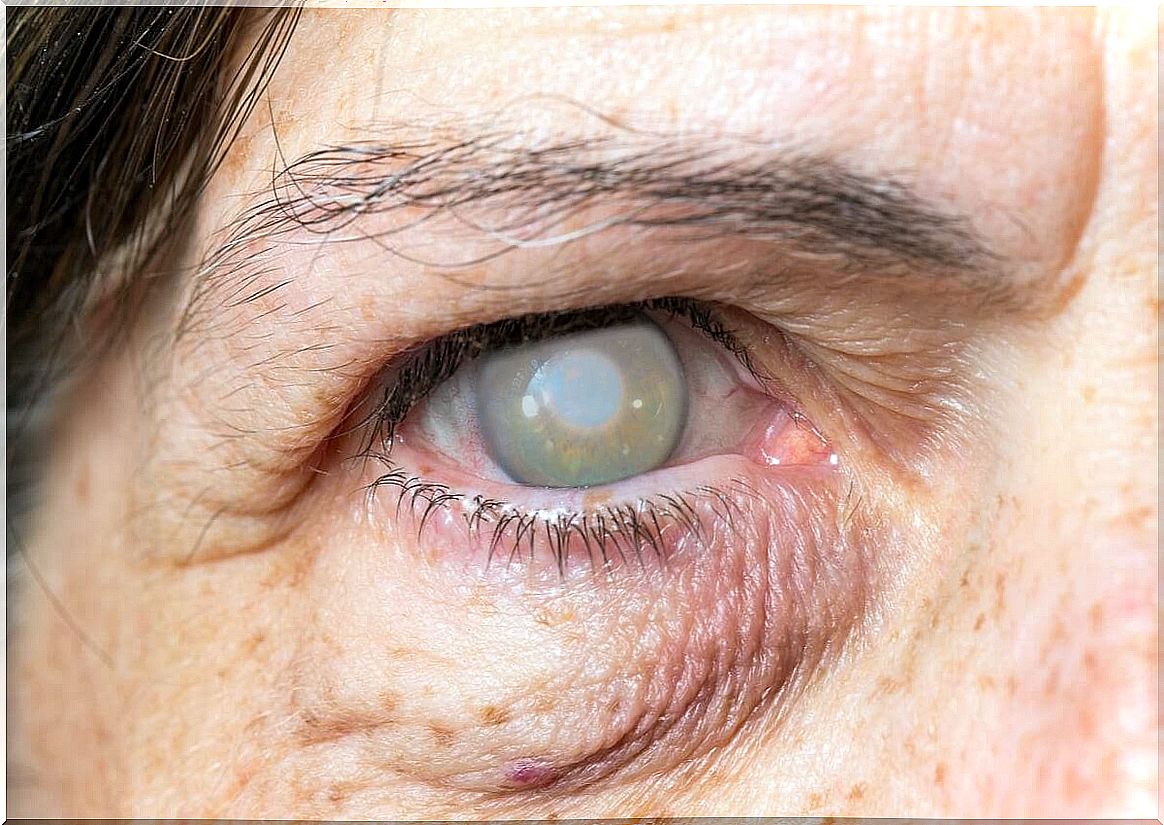Vision Loss: Causes And Symptoms
Sudden vision loss is a major problem these days that should not be ignored under any circumstances. Here we list some of the most common causes and symptoms.

There is no doubt that sight is one of the most widely used senses. Hence, vision loss is a serious problem that drastically changes life. Do you want to know what are the causes and symptoms of this problem? Read on to find out more.
First of all, at least one of the agents involved in vision must be impaired for a decrease in vision to occur. With this in mind, partial or complete blindness occurs when there is a problem with the cornea, lens of the eye, retina, or optic nerve.
Causes of partial blindness
When we speak of partial blindness, we mean those people whose eyesight has deteriorated significantly, but who are still able to distinguish certain shapes, lights and shadows. So it is not a question of a complete loss of this sense, but its use is made very difficult.
Depending on the origin, this type of blindness can be chronic or acute. Now let’s look at the most common causes of partial vision loss.

Corneal injuries
Any injury to the tissue surface creates a scar, and the cornea is no exception. This scar eliminates the transparency of the cornea, which prevents light from reaching the retina. This in turn leads to decreased visual acuity.
Injuries to the cornea can have a variety of causes, from severe infections to direct trauma. Any stimulus that can damage the corneal cells to a considerable depth can cause partial blindness.
The affected field of vision varies depending on the location and size of the scar. In this sense there is no specific display pattern. However, you may experience the following symptoms:
- Blurred vision: or an area of black or dark vision
- Pain: with itching in the affected eye
- Watery eyes
- Red stain
- Scratchy feeling: the feeling of having something in mind
Cataract
Another common cause of partial blindness is cataracts. These are opacities in the lens, the most important refractive agent in the eye. This opacity prevents the light from adequately reaching the retina, resulting in partial loss of vision.
In the majority of cases, cataracts occur due to degeneration or injury to the lens. According to various studies, cataracts are the cause of 47.9% of blindness in older adults.
The main symptoms that people with cataracts report include blurred, cloudy, or foggy vision, faded colors, and poor night vision. They also report on very bright-looking lights and rings of light around bright light sources as well as double images.
Retinal problems
The retina is the part of the eye that is responsible for converting light signals that are sent from the eye lens to the brain for processing. Therefore, any injury to the retina can lead to loss of vision.
In most cases , retinal problems are caused by defective capillaries that filter fluid into the tissue. Therefore, among the most common causes, we can find the following:
- Diabetic retinopathy
- Blockage of arteries or veins in the eye
- Tear in the retina
- Partial detachment of the retina
- Hypertensive retinopathy
However, there are other types of retinal injuries that are not related to the presence of fluids. An example of this is macular degeneration, where the center of the retina begins to deteriorate, creating blurred vision or a blind spot in the field of view.
Finally , various fungal, parasite, or bacterial infections can cause serious damage to the retina. This is the case with ocular toxoplasmosis, which is very common in people with immunosuppression.
Problems with the optic nerve
The optic nerve is responsible for transmitting all information received by the retina to the brain and is therefore also an indispensable part of vision. Problems with the optic nerve usually affect one or more fields of view.
In most cases, they are caused by a glaucoma. This is a common condition that increases pressure inside the eye, affecting the nerve. Then the nerve is unable to transmit the signals properly, making it difficult to see.
However, there are a number of other diseases that can lead to partial blindness and affect the optic nerve, such as neuritis nervi optici (inflammation of the optic nerve). In addition , indirect effects from cerebral vascular events or tumors in the central nervous system also affect vision.
It should be noted that the symptoms of optic nerve lesions can vary depending on their cause. Usually , however, there is rapid loss of vision, reddish saturation in one or more fields of view, double vision, and eye pain.

Causes of Complete Blindness
On the other hand, a person can also suffer from complete blindness. This occurs when a person is unable to distinguish neither light nor shadow.
The situations that can lead to total vision loss can be the same as those that cause partial blindness. However, at this point they are in their terminal stage.
Trauma or serious injury
If the trauma is very severe and affects the entire cornea, total blindness can result. One of the most common causes of this type of injury is chemical burns.
But not only injuries to the cornea can impair visual acuity. Injury to the head or the eyeball, whether piercing or blunt, can damage the optic nerve and retina.
Complete detachment of the retina
Earlier we mentioned the partial detachment of the retina as a cause of partial blindness. However, if it is not treated in time, it can continue to the point of complete detachment and thus prevent vision altogether.
In most cases, it occurs due to the presence of fluid in the back of the retina. This will sever the tissue of the eyeball and cut off the blood supply, leading to ischemia and the death of the area.
Although this can be asymptomatic and painless at first, some people may experience the following symptoms:
- Appearance of spots in the eyes
- Sudden lights in all fields of vision
- Blurred vision
- Sudden loss of peripheral vision and then central vision
End-stage diabetic retinopathy
Diabetic retinopathy is one of the complications of diabetes mellitus. It affects the retinal capillaries, which filter fluid into the retina and promote the deposition of substances. It can also block some healthy blood vessels.
Partial blindness can occur in the early stages of this disease, but if nothing is done to prevent the disease from progressing, it will ultimately result in complete vision loss.
This is because in the end stage, new blood vessels with very thin walls appear that try to supply the tissue adequately. These new capillaries are prone to rupture spontaneously and produce retinal hemorrhage.
Endophthalmitis
Endophthalmitis is a rare cause of vision loss. This is an infection inside the eye that should always be considered a medical emergency.
External microorganisms can enter the eye after eye surgery or injury, causing this inflammation. However, it can also be caused by an internal septic infection that has infected the eye.
Symptoms in people with endophthalmitis include severe eye pain with reddening of the eyes and a yellow, white, or purulent discharge inside the eyeball. In addition, the eyelids become inflamed.
Vascular occlusion
All blood vessels in the body can become blocked. If the blood vessels of the retina or the optic nerve are blocked, the affected person suffers a painless loss of vision.
If the affected blood vessel is the central retinal artery or the optic nerve artery, the tissue is not adequately supplied with blood. This leads to an insufficient supply of oxygen, which can cause it to die and be permanently damaged.
On the other hand, when the central vein of the retina is affected, there is insufficient blood outflow. This causes fluid congestion, which is an excessive build-up of fluids in the tissues, which leads to blindness.

When should I see a doctor if I lose my sight?
Complete or partial loss of vision should always be considered a medical emergency. In many cases, it can be painless, although that doesn’t mean the problem is any less serious. Therefore, one should never ignore such a situation.
For this reason, it is imperative to see a specialist as soon as possible so that they can carry out the appropriate tests and make an accurate diagnosis. Many of the possible causes only allow a short period of time before the damage is irreversible.
It is important to clarify that if the loss of vision cannot be reversed, lifestyle changes will need to be made. Fortunately, today there are many ways that visually impaired people can go about their daily activities without inconvenience.









